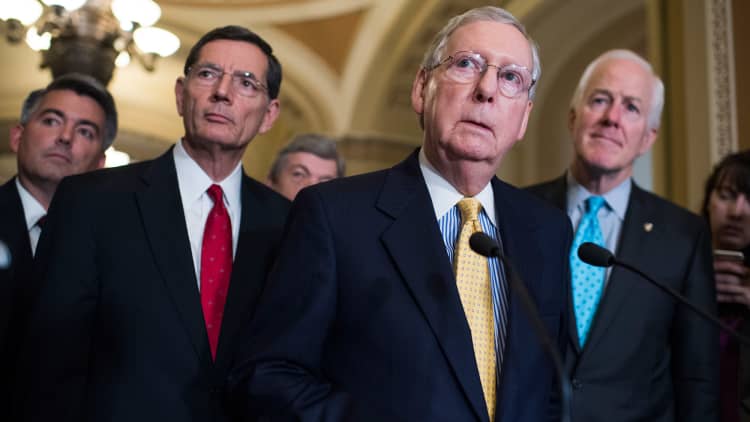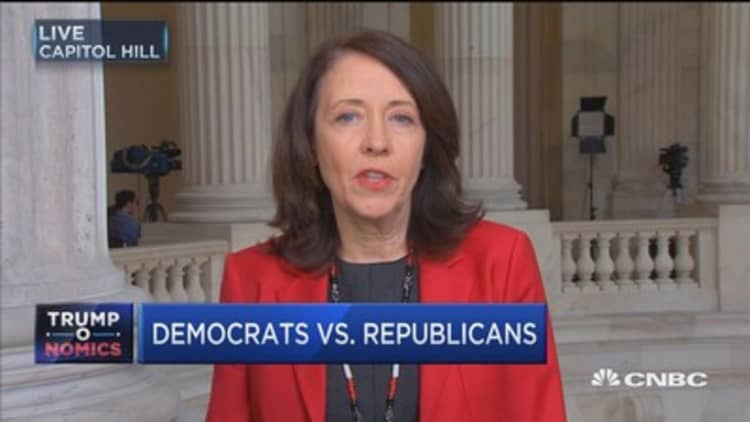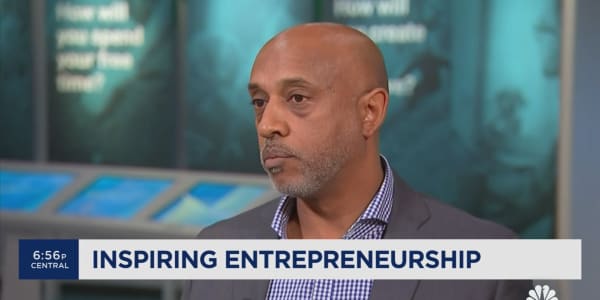
States continue to grapple with the fate of their health insurance exchanges in 2018, even as the Senate released its version of the repeal to Obamacare.
As of June 20, some 31,268 insurance exchange enrollees in 44 counties, all based in Missouri, Ohio and Washington state, are at risk of having no insurers available to them next year, according to the Kaiser Family Foundation.
Individuals who require financial assistance to afford a policy would be hit especially hard by these changes, as they can only use their federal subsidies for coverage from the exchanges.
Large insurer Anthem also announced it would leave exchanges in Ohio, Wisconsin and Indiana in 2018.
The Senate's bill, called the "Better Care Reconciliation Act," would continue to reimburse health insurers for subsidies that lower out-of-pocket expenses for low-income customers.
"In 2018, the worst-case scenario is that you're not able to avail yourself of the subsidies and you can't afford to buy coverage at all," said Karen Pollitz, senior fellow, health reform and private insurance at Kaiser.
To provide exchange customers with some certainty for next year, state insurance regulators have gone back to the drawing board in a bid to keep insurers selling in these "bare counties."
Here's what you might see unfold in your state if your local marketplace is looking thin in 2018.
States stepping up
As legislators prepare to duke it out over the health-care bill, insurance regulators are taking steps to shore up the market in their respective states.
In Washington state, for instance, two counties were at risk of having no insurers in 2018. Earlier this week, following discussions with Insurance Commissioner Mike Kreidler, Premera Blue Cross agreed to remain in one of the counties.
"We have to make sure that we take the steps necessary to make it easier for insurers to work in rural counties where they face challenges," Kreidler said.

"This includes fewer providers, greater challenges building provider networks, and lower income and more poverty in those rural counties," he said.
Bargaining on risk
States can also take some of the risk off the table for insurers to entice them to stay by funding their own reinsurance pools.
Alaska, Minnesota and Maine have experimented with these programs to strengthen their individual markets.
"A carrier with a disproportionate share of bad risk can be reimbursed by the state, which makes it easier for the carrier to participate in the market and offer affordable premiums," said John Barkett, director of policy affairs at Willis Towers Watson.
In 2018, the worst-case scenario is that you're not able to avail yourself of the subsidies and you can't afford to buy coverage at all.Karen Pollitzsenior fellow, health reform and private insurance at Kaiser Family Foundation
Iowa this month proposed a stopgap measure to the Centers for Medicare and Medicaid Services, aiming to ensure that customers in the state have access to individual coverage in 2018.
The proposal calls for Iowa to repurpose federal money to provide age- and income-based premium subsidies and bolster a reinsurance program that will reimburse insurers for high-cost claims.
In order for insurance companies to participate in the reinsurance program, the state will require them to offer a standardized plan that meets ACA requirements in 2018.
Finally, states can squeeze insurers, requiring them to cover certain counties in order to continue selling in other markets within the state, said Katherine Hayes, health policy director at the Bipartisan Policy Center.
That tactic is iffy.
"If it creates too big of a burden and the insurer believes this drives up premiums for everyone else, they might make that argument against it," Hayes said. "They may also argue that they'll leave the market [in that state] completely."
Limited options
Your choices are limited if you wind up residing in a place with no available coverage via the exchanges and you depend on federal subsidies.
Here are a few suggestions for next year if you end up in this predicament:
Do your homework: Contact a local insurance broker to see if there's coverage that's available outside of the exchanges. An insurer may back out of a state marketplace, but still offer individual coverage through brokers.
If you obtain individual coverage: Ask whether your policy is compliant with the Affordable Care Act, said Barkett of Willis Towers Watson. That is, does it cover essential health benefits, including hospital care, pregnancy and childbirth, and doctors' services?
If you're your own boss: See about obtaining coverage through associations, and be sure to ask about the details of the plan.
For instance, a small-business owner may be able to get insurance through the National Federation of Independent Business, while members of the Freelancers Union may have access to coverage.






